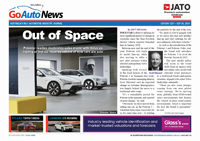Make / Model Search
News - ToyotaThumbs up for local economyNot catching a cold: Toyota Australia president Max Yasuda. Toyota and the FCAI see good reasons for Australia to stay positive for 20099 Jan 2009 SENIOR industry figures are optimistic that the Australian automotive industry will avoid the worst of the global recession, but are still predicting a greatly reduced market in 2009. Toyota Australia president Max Yasuda said that Australia should avoid the worst of the global downturn. And, while its parent company is drastically reducing capacity in the US and Japan, the Australian operation has no plans to reduce its workforce of 3000 at Altona in the foreseeable future. “It used to be said that, when America sneezes, Australia catches a cold, but that is clearly not the case in the current situation,” said Mr Yasuda this week. “Our economy, the automotive industry generally and Toyota Australia specifically are coping better than most. “The 2008 automotive sales results and the projections for 2009 compare more than favourably with the rest of the world.” Although Toyota has reduced the line speed at Altona by about seven per cent to reduce output, it has not scheduled any extra non-production days and has not reduced its workforce. Having just shipped a record 100,000 cars to the Middle East last year, Toyota Australia does not see a big reduction this year because the Arab states have not been greatly affected by the global recession. The company this year is gearing up for facelifted versions of the four-cylinder Camry and V6 Aurion in the third quarter and the introduction of the hybrid Camry in 2010. Toyota Australia believes the car market will be a key indicator of a general economic recovery and is cautiously forecasting a market of 900,000-plus for 2009.  This is slightly more optimistic than the Federal Chamber of Automotive Industries’ estimate of 880,000 (which would be 13 per cent down on 2008), but FCAI chief executive Andrew McKellar (left) still wants the local car industry to remain positive. This is slightly more optimistic than the Federal Chamber of Automotive Industries’ estimate of 880,000 (which would be 13 per cent down on 2008), but FCAI chief executive Andrew McKellar (left) still wants the local car industry to remain positive.“The mood of the industry going into 2009 must not be one of doom and gloom,” said Mr McKellar. “The industry must maintain its confidence and we must instill that confidence in the marketplace. Rebuilding confidence and stabilising the market is in everyone’s interests. “The challenges facing the industry and the wider economy have not yet passed (and) we must be realistic about the market outlook. “Consumer confidence has fallen as a result of the global financial crisis, the number of people without jobs is expected to rise and some showrooms are also yet to resolve long-term financing arrangements (but) the FCAI and the industry are committed to working through these issues and helping restore confidence and maintain stability in the market. “To put things in perspective, the motor industry has weathered downturns of similar magnitude in the past. In 1987 sales fell 14.7 per cent and in 1991 they were down 16.6 per cent – in both cases, those years were followed by recovery. “The message for 2009 is: ‘Maintain our confidence’.” Mr McKellar said there were a number of positive signs for the industry going into the new year, including falling fuel prices, lower interest rates and the federal government’s economic stimulus moves. He also noted that the local industry will be busy preparing for the implementation of the government’s new car plan, including the Green Car Fund and a new tariff structure from the start of 2010, and the proposed emissions trading scheme, while Treasury boss Ken Henry’s review of Australia’s tax system will also take place this year. “The FCAI, on behalf of the industry, will be making thorough representations to this inquiry,” said Mr McKellar. “People buying new motor vehicles pay a number of different taxes – many of them unfair and designed on a piecemeal approach.” One of the issues the FCAI will push is the abolition of the Luxury Car Tax, which is opposed by every manufacturer and importer, including those whose sales are not affected by the LCT. In relation to the global auto industry situation that has seen Toyota Motor Corporation slip into the red for the first time in its history, forcing a reversal of its worldwide production expansion, Mr Yasuda noted that his parent company had acted quickly to minimise the damage. “Long before the global credit crisis, Toyota Motor Corporation was acting to ensure it did not become complacent,” said Mr Yasuda. “As a result, while the impact of recent events has been severe, Toyota is well-placed to weather the economic uncertainty – it has a strong balance sheet, healthy cash reserves, AAA credit rating and important new model initiatives in the pipeline. “In the current situation, there is no consensus as to when conditions will turn the corner. Equally, there is no magic formula for coping with the sudden changes in the business environment. “Toyota’s response has been quick and decisive, with far-reaching measures designed to reduce costs significantly (while) maintaining strategies for mid- to long-term growth. “Capital investment and R&D spending are keys to our future, so we are not planning on over-reacting to the immediate situation. We will achieve more efficient investment and R&D spending by focusing on the most important issues.” |
Click to shareToyota articlesResearch Toyota Motor industry news |









Facebook Twitter Instagram